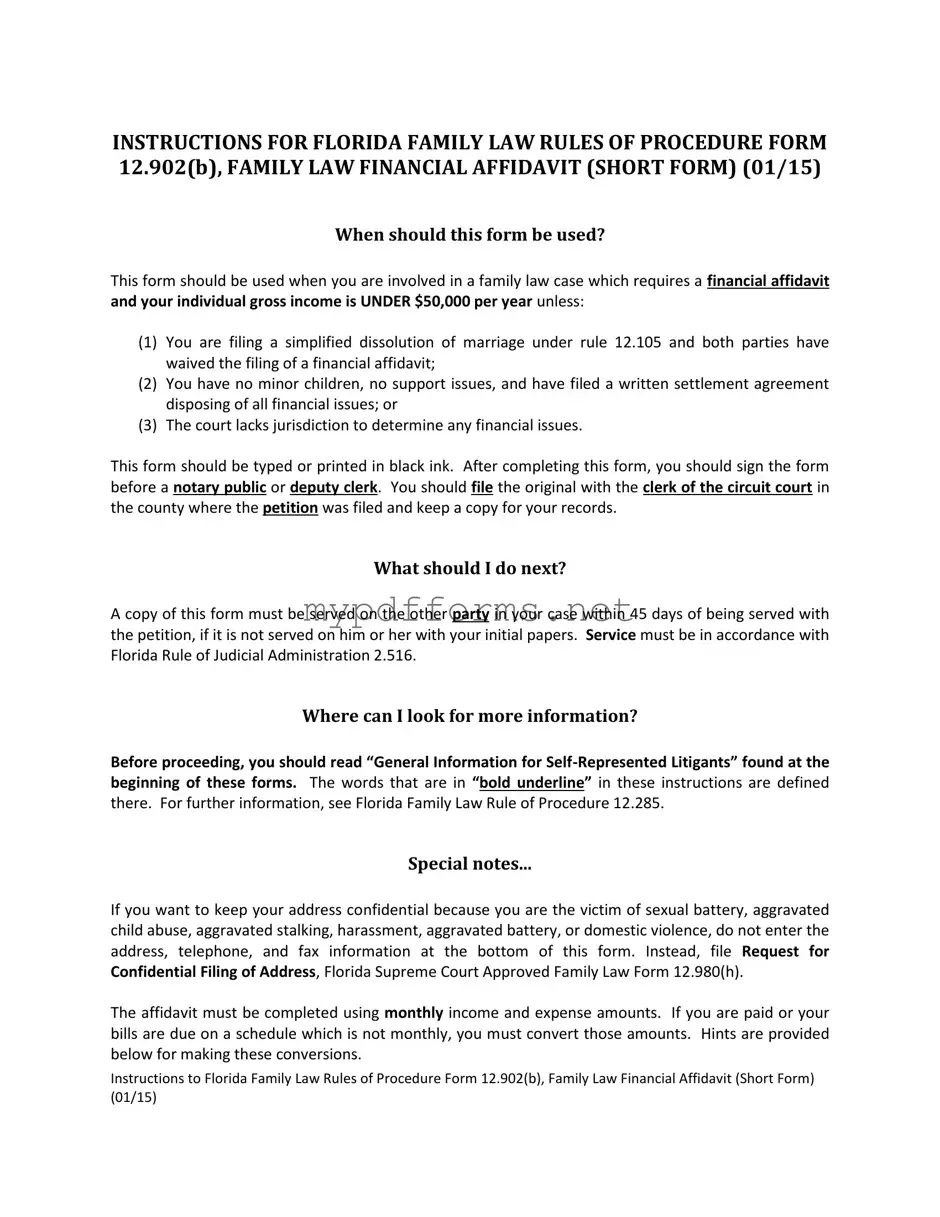The Florida Financial Affidavit Long form 12.902(a) is similar to the Short form in that both are used to disclose an individual's financial situation during divorce or child support proceedings. The Long form, however, requires more detailed information, including a comprehensive list of assets, liabilities, income, and expenses. This additional detail is often necessary for more complex financial situations, ensuring that the court has a complete picture of both parties' finances.
The Florida Family Law Financial Affidavit for Child Support (Form 12.902(c)) also shares similarities with the Short form. Both documents aim to provide an overview of financial circumstances to assist in determining child support obligations. While the Short form is a more concise version, the Child Support affidavit focuses specifically on income and expenses related to child support, making it essential for cases involving children.
The Florida Petition for Dissolution of Marriage (Form 12.901(b)) is another document that relates to the financial affidavit. While the petition initiates the divorce process, it often references the financial information that will be detailed in the financial affidavit. Both documents work together to present a full picture of the marital situation, including financial aspects that the court must consider.
The Florida Financial Disclosure Statement (Form 12.902(d)) is also relevant. This form is used in conjunction with the financial affidavit to provide a more comprehensive view of a party's financial condition. Both documents require similar information, but the Financial Disclosure Statement may be used in specific contexts, such as during mediation or settlement discussions, to ensure transparency between parties.
The Florida Child Support Guidelines Worksheet (Form 12.902(e)) is another document that complements the financial affidavit. While the financial affidavit provides a broader view of finances, the Guidelines Worksheet focuses specifically on calculating child support amounts based on income and expenses. Both forms are essential in ensuring that financial obligations are fairly assessed and enforced by the court.
The Florida Uniform Child Custody Jurisdiction and Enforcement Act Affidavit (Form 12.902(f)) is related in the sense that it addresses financial considerations indirectly. While its primary focus is on custody issues, the financial affidavit may be referenced to understand the financial stability of each parent. This can influence custody decisions, making both documents integral to the overall case.
For those navigating property transfers in Pennsylvania, understanding the Quitclaim Deed is essential; this legal document facilitates the transfer of real estate ownership without any warranties regarding the title. To streamline this process and access the necessary forms, you can visit https://quitclaimdocs.com/fillable-pennsylvania-quitclaim-deed and get started with filling out the required documentation.
The Florida Notice of Social Security Number (Form 12.902(g)) is another document that connects to the financial affidavit. While it primarily serves to protect personal information, it is often submitted alongside financial disclosures. This ensures that all financial matters are handled with the necessary privacy and security, while still allowing the court to access relevant financial data.
The Florida Affidavit of Compliance with Mandatory Disclosure (Form 12.902(h)) is essential for ensuring that both parties have shared their financial information. This document confirms that all required financial disclosures, including the financial affidavit, have been provided. It reinforces the importance of transparency in the financial process during divorce or custody proceedings.
Finally, the Florida Parenting Plan (Form 12.901(a)) may also reference financial obligations that are outlined in the financial affidavit. While its primary purpose is to establish a parenting plan for children, it often includes considerations related to child support and financial responsibilities. Both documents work together to ensure that children's needs are prioritized while also addressing the financial realities of each parent.

